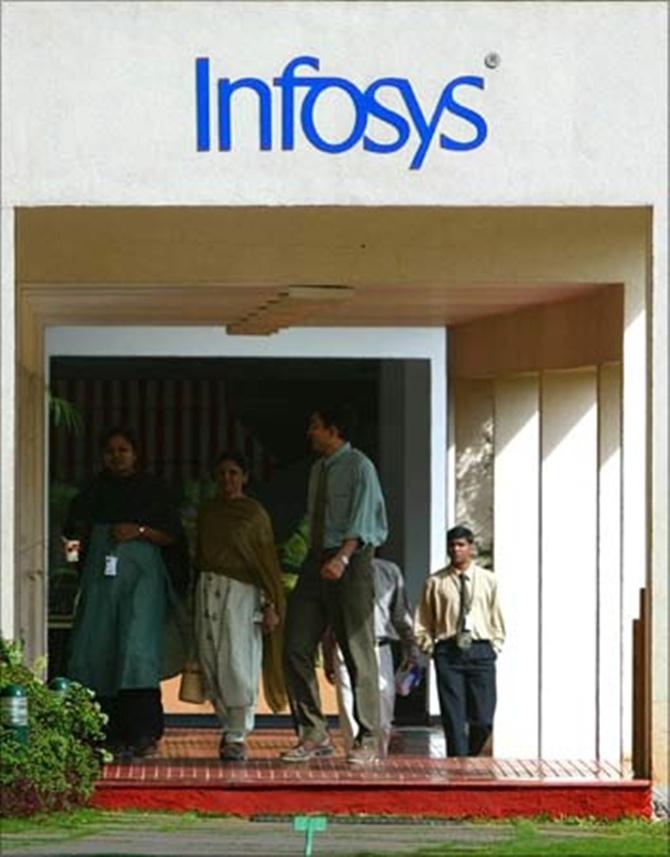Photographs: Reuters Itika Sharma Punit in Bengaluru
Most information technology services are battling skill mismatch, owing to a shift in the nature of demand and the competition from new players.
To tackle these issues, these companies are now investing in re-training and re-skilling employees.
Recently, S D Shibulal, chief executive of Infosys, said the city-based Indian IT giant’s performance during the quarter ended March had taken a hit due to ‘mismatches between skills that clients need and what we have’.
Amid such circumstances, several IT services companies have narrowed their hiring to focused profiles and specific skill sets rather than bulk hiring of freshers from campuses.
. . .
IT giants scramble for talent as demand changes, job offers rise
Image: Sources say some large companies are also letting go of employees who aren't open to re-skilling.Photographs: Reuters
Sources say some large companies are also letting go of employees who aren’t open to re-skilling.
This, it is said, is one of the reasons for the high attrition rate across the sector for the quarter ended March.
During the quarter, Infosys saw its attrition rate rise to an all-time high of 18.7 per cent, while Wipro, another city-based company, reported a 140-basis-point increase in attrition, compared to the year-ago period.
HCL Technologies’ attrition rose to 16.9 per cent from 14.2 per cent in the corresponding quarter last year.
. . .
IT giants scramble for talent as demand changes, job offers rise
Image: At 11.3 per cent, TCS, which has the lowest employee attrition compared to its peers, also saw a marginal rise in attrition, compared with 11.2 per cent a year ago.Photographs: Reuters
At 11.3 per cent, TCS, which has the lowest employee attrition compared to its peers, also saw a marginal rise in attrition, compared with 11.2 per cent a year ago.
“It (the high attrition) is not happening because of expectations of higher compensation alone, but because of the pressure of the changing business model and skill profiles needed to execute the works,” said Anant Gupta, president and chief executive of HCL Technologies.
“To that extent, in the short term, it appears to be a risk.
“But in my view, in the mid-to-long term, it is more beneficial because at the end of the day, this is the more sustainable model.
“As an organisation, we are driving more fungibility of resources; we are driving multi-skilling,” he added.
. . .
IT giants scramble for talent as demand changes, job offers rise
Image: Wipro has embarked on different initiatives to push re-skilling of employees.Photographs: Courtesy, Wipro Technologies
Wipro has embarked on different initiatives to push re-skilling of employees.
For example, the company has linked salary increments with employees’ skill sets and performances, instead of the numbers of years they have spent at the company.
While Wipro has announced an average six-eight per cent wage rise for offshore employees, it has said employees with niche skills might get rises of up to 20 per cent.
“We are giving our employees the choice to re-skill.
“There are some who will choose this, but there will be some who believe there are other places where they can continue with their current skill sets,” said TK Kurien, chief executive of Wipro.
Experts feel the primary reason for the sudden surge in the need for re-training is the shift in the technology landscape.
. . .
IT giants scramble for talent as demand changes, job offers rise
Image: With new technologies such as social, mobility and analytics gaining momentum and clients increasingly looking to leverage from the cloud to save costs, there is a need to build strong teams that specialise in these technologies.With new technologies such as social, mobility and analytics gaining momentum and clients increasingly looking to leverage from the cloud to save costs, there is a need to build strong teams that specialise in these technologies.
“While the factors behind this (skill mismatch) are many, one of the main reasons is the exploitation of technological innovations in view of cost-optimisation measures client companies are aggressively seeking out and adopting,” said Yeshasvini Ramaswamy, managing director of e2e People Practices, a human resources consulting and advisory services company.
Skill mismatch concerns have been aggravated, as contracts of IT services companies are increasingly moving towards fixed-priced ones, in which clients do not look at the amount of resources or the time expended and, therefore, vendors have to judiciously protect margins.
. . .
IT giants scramble for talent as demand changes, job offers rise
Image: Employees arrive for work at Tech Mahindra office building in Noida on the outskirts of New Delhi.Photographs: Adnan Abidi/Reuters
“Earlier, the time-and-material model was more prevalent.
“Under that, though the skills of newly-hired employees weren’t up to the mark, they were sending them to clients and getting billed.
“But today, the client doesn’t care where the work is being done from and is opting for a fixed-price model.
“This is increasing the problems for IT services companies, as they need to bear training costs and ensure the job is done well,” said Anurag Gupta, chief operating officer at Magna Infotech, a staffing solutions provider.
Attrition levels
- Infosys saw its attrition rate rise to an all-time high of 18.7%
- Wipro reported a 140-basis-point increase from the year-ago period
- HCL Technologies’ attrition rose to 16.9% from 14.2% in the year-ago period
- At 11.3%, TCS, which has the lowest attrition among peers, saw a marginal rise from 11.2 per cent a year ago
. . .








article